Like what you see here? Our mission-aligned Girl Geek X partners are hiring!
- Check out open jobs at our trusted partner companies.
- Watch all Elevate 2022 conference video replays!
- Does your company want to sponsor a Girl Geek Dinner? Talk to us!
Angie Chang: It’s time for our next session. Up next is Ashu Ravichander. She is an engineer and product manager, currently Principal Product Manager at Workday. And outside of her day job, she leads product for the Human Health Project, which is a nonprofit, connecting patients with mental health and other chronic diseases [inaudible] advocates that help them navigate the healthcare system. Welcome, Ashu.
Ashu Ravichander: Thank you, Angie. Let me start screen share. Okay. Hi, everyone. And thank you so much for joining this talk, writing the highs and lows where I’ll go over some of my techniques to navigating bad mental health days in the workplace. But first introductions.
Ashu Ravichander: Hi, I’m Ashu Ravichander and I’m currently a Principal Product Manager at Workday. I started out my career as an engineer in the healthcare space almost a decade ago now, and since then have built consumer and enterprise products for a wide variety of personas. On a personal note, I have two beautiful dogs and Boo, my cat, with my husband. Outside of work, I live in California now, so I love to kayak in the summers and ride bikes through the year.
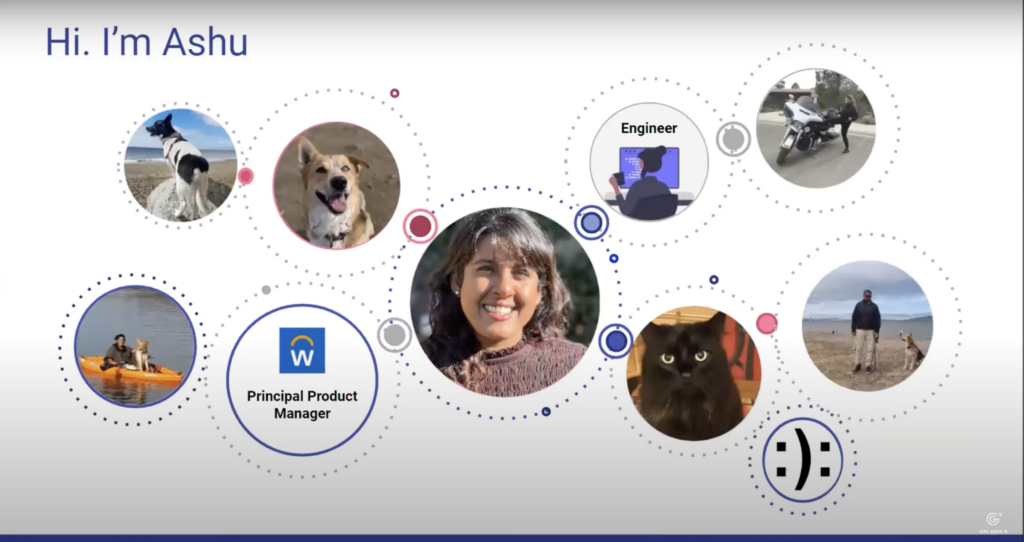
Ashu Ravichander: I also have bipolar disorder, type two to be specific. Most of my friends and coworkers know the first seven things about me but not the last, because that is not something I ever speak about since it’s not really well understood and is unfortunately so often conflated with your character and capabilities.
Ashu Ravichander: Now I have attended conferences and other events for past decade now, and I have heard some amazing speakers, but I wish 23-year-old me could have heard more people talking about mental health in a tech or professional setting so that it felt more normalized, and that I understood that it was just a difference and should never have been a reason to hold back.
Ashu Ravichander: That’s why I’m here today to kind of do this for 23-year-old me and for anyone else that may need to hear it because statistically, I know I’m not alone and you may not have a diagnosed mental health condition, but honestly, it’s a spectrum and we all have mental health. And some days, it just does not fare as well, whether it’s due to biochemical reactions, external stressors, thanks pandemic, or just being human.
Ashu Ravichander: I think this is important for everyone to hear and learn, to build resiliency. Now earlier, I used to compartmentalize my professional and personal self and never let it seep into the other, but this wasn’t sustainable. And if I wanted to bring my full self to work, I had to positively integrate my condition in because I also have ambitious career goals. And I knew I’m going to build amazing teams working on amazing products.
Ashu Ravichander: I started taking on a more mindful approach to work and making sure I had defenses up against any bad days. And that’s what I want to talk to you all about today. I’m going to walk through my personal experience about how I build resiliency around bad mental health days at work.
Ashu Ravichander: I go through five of the most basic and important things I have in my tool kit that help me be consistent and bring my best whenever I need to. And how I, and hopefully you, can use this to bring your whole self to work. I do want to also call out what the talk is not. None of these techniques are substitute for care, whether it’s self-care, meditation, medication, therapies. There are a lot of great resources out there and I do recommend you seek this out.
Ashu Ravichander: I have put years of work for myself into therapy and medication that has let me come to this point, to be here and talk you all. And I’d be more than happy to connect on this offline. Along with seeking out care, I want to stress that you need to treat your physical and mental health the same and take the time off, take the mental health days off if you really need to.
Ashu Ravichander: And finally, it is not a formula. I’ve had to develop what works for me over years of trial and error and I’m sharing what has stuck. This could look very different for you. And I hope you take this as a starting point to build the tools that will work for you. With that, let’s jump into five simple tools I use to bring my best work.
Ashu Ravichander: Now, my first technique is to build a playbook of templates, frameworks to help give me a leg up on really low energy days. I’m a Product Manager and we are the go to people about our products, right? Quite often, I find that I have to turn around and create something like white papers or business cases for really different audiences in a very short timeframe.
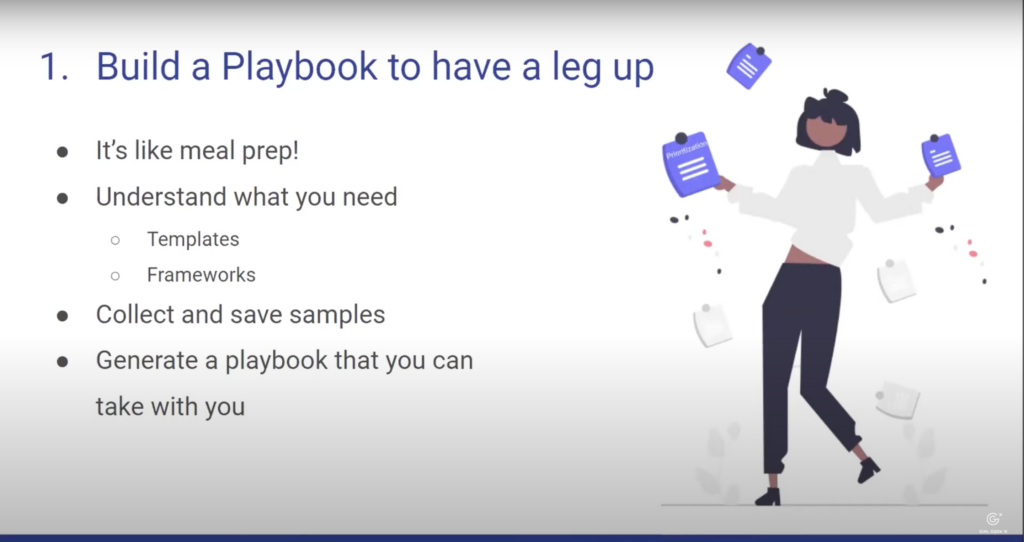
Ashu Ravichander: But what do I do if this falls on a really low day for me, where my energy is not where it would normally be? I don’t want to do a bad job just because the timing wasn’t right. I knew I had to do something different to accommodate for this.
Ashu Ravichander: I looked at the most common things I might need on a daily or weekly basis and figure that if I had a template or a framework for these things, then I would always have create starting points for my most common deliverables.
Ashu Ravichander: Think about it kind of like meal prep on a weekday after you’ve had this hard time at work, you finished all your chores, you know you need to have a nutritious balanced meal, but you just don’t have the mental of physical energy to cook up anything elaborate.
Ashu Ravichander: If you do meal prep on the weekend and have some pre-prepared proteins and chopped and season vegetables, then all you really have to do is heat it up, maybe add a really simple salad to it, and wow, you’ve got a great nutritious meal ready.
Ashu Ravichander: The templates that I collect are kind of the same thing. If I get asked to put a business case template together, I already have a starting point with my business case template and you and I know that formatting is 50% of the work. I already have a leg up.
Ashu Ravichander: I also have notes, prompts and question of these to make filling it out easier, almost Mad Libs style. For example, in my business case deck, I have a section on the success metrics and I have a little prompt there that reminds me to detail out the product metrics and how that could tie into the organization’s metrics or OKRs that they’re tracking.
Ashu Ravichander: Now when I need to fill it out, even if I’m having an off day, I’m making sure I cover the right points and details.
Ashu Ravichander: Over the years, I have collected and continue to add what I need in my day-to-day work to my playbook. So far, I have a roadmap deck, feature requirement templates, business case decks, prioritization frameworks, and a few more things that I can lean on.
Ashu Ravichander: I also have the privilege of working with some amazing coworkers and teams in various organizations. Every time I see an impactful presentation or document, including some that we saw in the conference earlier today, I constantly think about my playbook and either ask for a copy or adapt a template from it.
Ashu Ravichander: I have a folder for my work computer with these samples and templates labeled with all the organization teams and branding, but I also make a generic and non-branded templates for myself to use with links to publicly available themes and icon collections, and have it on my private Google Drive, so I know I can port this playbook with me.
Ashu Ravichander: Next, I have what I like to call, spacers. One thing I have learned from cycling through highs and lows is that everything passes. So it really helps me to buy some time or create spaces between me and the critical event or task till I can get back in that right state and have appropriate and reliable responses.
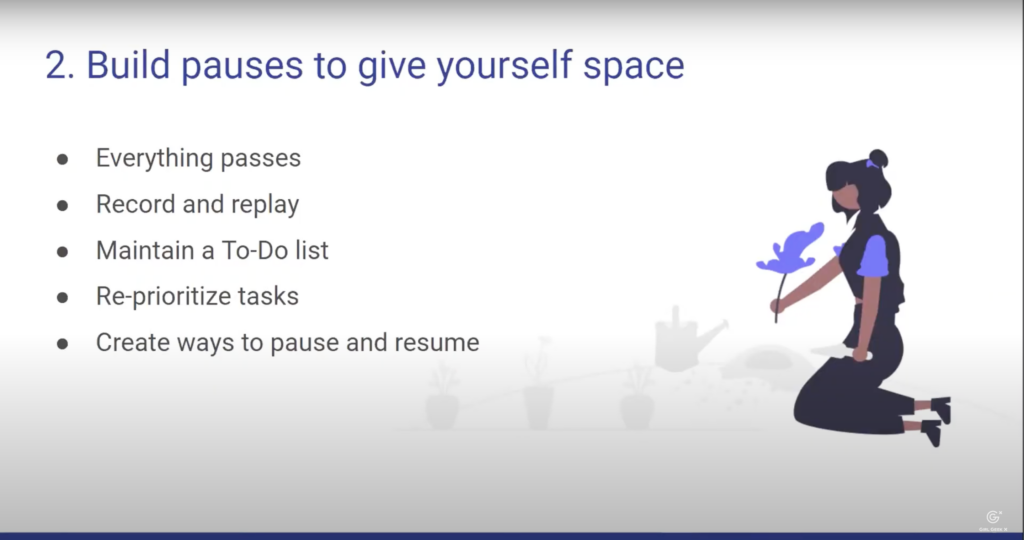
Ashu Ravichander: A few weeks ago, my dog Arby, he had surgery and I think it was on a Wednesday. And I remember I was like a complete wreck that day, but I was still in a few meetings where I needed to make sure I had a handle on the project we’re working on.
Ashu Ravichander: I tried to be as present at the meetings, but since I knew it was going to be a high stress day, I asked for all meetings that day to be recorded.
Ashu Ravichander: For meetings that I couldn’t record, I had my transcription app open, so I had the whole meeting transcribed and had notes for myself. I spent the rest of the day doing less intense tasks, like I think I just sorted through some old detail that I needed and replied to older emails.
Ashu Ravichander: Then at around 6:00 PM, the vet calls me and he tells me, “Arby has made it through surgery. Just fine. It was awake.” I finally felt like I could breathe and got back into that right state of mind.
Ashu Ravichander: Now I know there was some questions asked of me in the meetings and some follow-ups. To make sure I didn’t miss anything, I just replayed my meetings from the day at 2X speed, of course, and looked at the transcription so that I could catch up.
Ashu Ravichander: Now, recording and transcriptions are a good way to build spacers, but there are other ways I do this too, depending on the situation, like shuffling around some of my tasks, so working on more routine or repetitive tasks when I’m stressed and then the more important tasks later, or responding to infuriating emails only after I spent some time out watering my garden and having to think about it, either way a very well-watered garden in case you were wondering.
Ashu Ravichander: But it is a slippery slope between building a spacer and procrastination. I have seen this and experienced it. So I have had to make a sacred rule about maintaining a to-do list in a single spot, which I have to regularly review before starting another task.
Ashu Ravichander: The bottom line here is find out what works for you. Pause, prioritize, and come back to situations or tasks when you are ready.
Ashu Ravichander: Now, the third technique I use is to ask for feedback early and often to almost have a reality check. I’m not going to lie to you. It’s hard to ask for feedback and I am still putting this into practice, but I know it has a big payout.
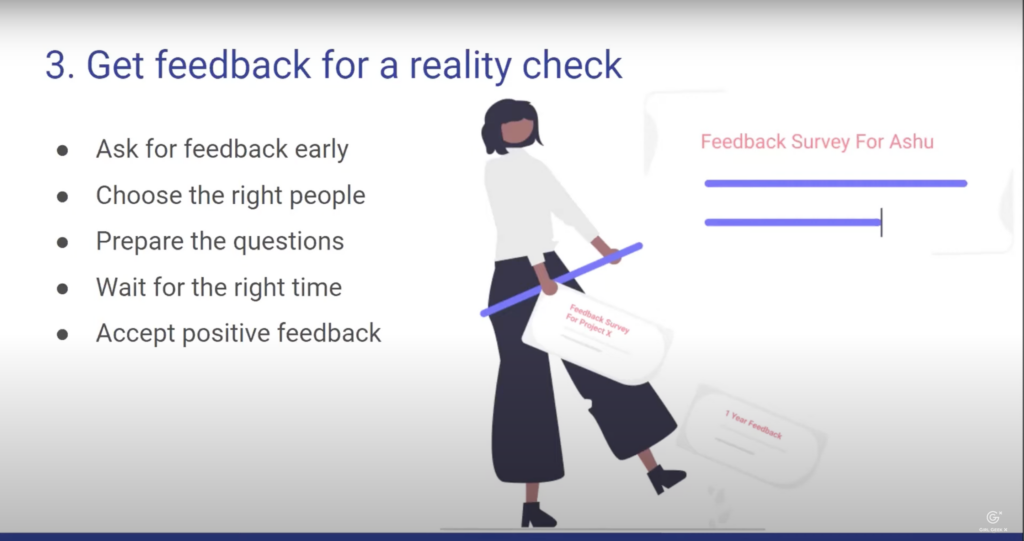
Ashu Ravichander: Almost all the time when I’m in a depressive phase, I find that I’m putting myself down almost relentlessly. For example, recently I forgot an edge case while writing product requirements, and someone pointed that out during the review.
Ashu Ravichander: Now my inner voice starts telling me that I’m a terrible product manager, because I couldn’t think of that edge case scenario upfront, and that I’m probably not qualified for this job. Even though rationally, I know it’s not possible to think of all edge cases that could possibly occur.
Ashu Ravichander: And in fact, product requirements are a collaborative effort that grows and improves with feedback and maybe my multiple engineering degrees and a decade of releasing successful enterprise scale products may say otherwise.
Ashu Ravichander: However, this constant cycle of thoughts really magnifies the imposter syndrome. And what I’ve found breaks the cycle is having factual evidence or conversations to overcome it.
Ashu Ravichander: For me, especially at the start of new jobs on new projects when I am still working on getting up to speed or where in storming phase of the project, I find that I’m a lot harder on myself about not being further along and the imposter syndrome is on high gear, and almost always.
Ashu Ravichander: The people around me recognize that the reality is that we are in the storming phase of the project and that it’s normal and we’ll get better with collaboration or that it’s only been two months since I joined, so it’s actually okay to not know as much.
Ashu Ravichander: I ask for feedback early in these cases so that I’m being grounded and have a better pulse on reality versus what the imposter syndrome’s telling me.
Ashu Ravichander: Now it is important to get feedback from the right people. Just because someone is on the same project as you, doesn’t automatically make them a great person to get feedback from.
Ashu Ravichander: For me, these have to be people have a great professional relationship with. I know that they know me and I feel comfortable asking and really discussing their opinions.
Ashu Ravichander: I also prepare what I want to get feedback on because it is important to know why you want feedback and what you’re going to do with it. Is it a specific action on a project or your working style with a team or something else?
Ashu Ravichander: Vague questions give you vague answers. So take the time to prepare the questions to make this meaningful. I also know I need to wait for the right time when I know I’m in a good place mentally to accept the feedback and not be defensive about it.
Ashu Ravichander: And the last thing I’ll leave you with on this topic is a reminder to accept positive feedback. Earlier, I used to spend most of my time reviewing my feedback and focusing only on the negative, because these are areas I could take action on to improve.
Ashu Ravichander: And I would completely gloss over anything positive since my reviewer probably didn’t mean it or they were just saying it to be nice that there was really nothing actionable for me there.
Ashu Ravichander: But now I know it is so important to focus on the positive so that you know what’s working and what strengths you have that you can lean into more. Seek and accept positive feedback.
Ashu Ravichander: Now this next technique is a more recent discovery for me. And I can tell you, it has absolutely been redeeming already. You may have heard this before.
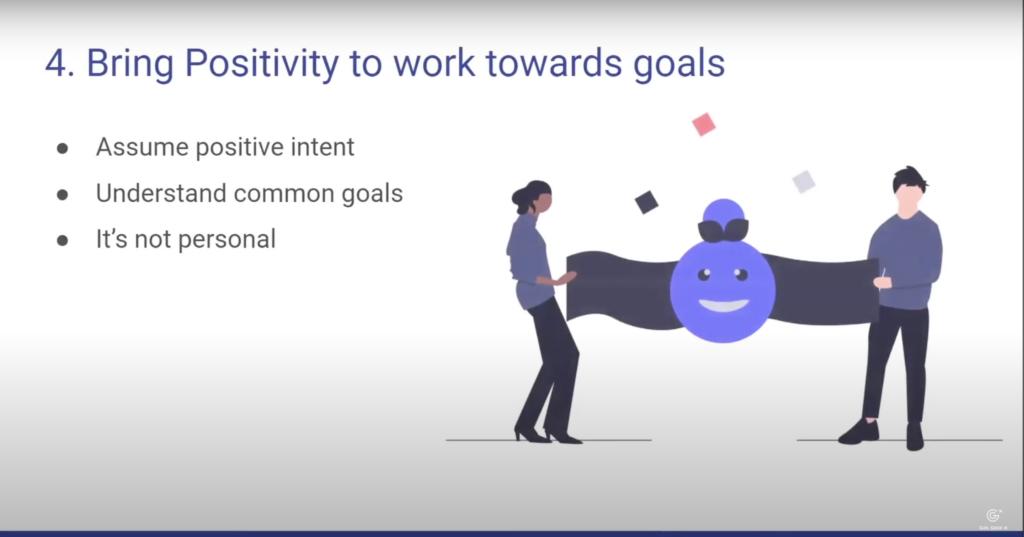
Ashu Ravichander: Assume positive intent. Practicing this a few times has already helped me so much that I know this one will stick in my tool kit for a long time. So uncertain days with interpersonal interactions, I’m sensitive and sometimes read too much into things, like why does my coworker hate me?
Ashu Ravichander: Just because they said something contradictory or spoke over me in a meeting. There was a time this would have upset me so much that I’d be crying in a bathroom stall over it.
Ashu Ravichander: Now as a bottom line, I just assume everyone I interact with at work has positive intent. It helps me not be angry or annoyed over it, but look at it situationally.
Ashu Ravichander: In the case where someone interrupts me in a meeting, I’m now thinking that you just interrupted me to say something, not because you wanted to cut me off, but because you had something to say that felt unheard.
Ashu Ravichander: Okay. With this context in my mind, I’m going to repeat what he said so you know that I hear you and then go on to the point I was making. In an organization, especially one with great culture, you very rarely meet actual bad players. Instead, if in a conversation or project, if we have that common goal understood, it’s easier to assume that everyone has positive intentions to work that’s that common goal, albeit in different ways.
Ashu Ravichander: It’s usually not personal or malicious attacks, so remember your common goals, and assume everyone works towards it with positive intentions.
Ashu Ravichander: Now I saved this one for the last, because for me, one of the bigger challenges I’ve faced in the workplace with my disorder is the disproportionate reaction to certain situations on certain days. It could be as simple as someone pointing out a mistake I made or getting some not so positive feedback.
Ashu Ravichander: Either of these simple reactions or interactions could have resulted with breaking down into tears when I got home or sinking into depression. This kind of extreme reaction is hard to deal with when you now have to get on with the rest of your day and go into a three-hour grooming session with your engineering team.
Ashu Ravichander: What has really helped me here is finding a few key people who are my anchors and help ground me and rationalize my thought process. A simple conversation or text with my anchors, where I describe a certain situation, helps me understand what a rational response would look like from their perspective versus how my brain might be exaggerating it, and this really helps center me.
Ashu Ravichander: One thing I must caution you about here is the fact that this can be extremely exhausting for the people you reach out to. Be mindful of that and make sure you have a few different trusted people that you can talk to, so you can load balance it without bringing any one single person, but don’t hold back on reaching out to people.
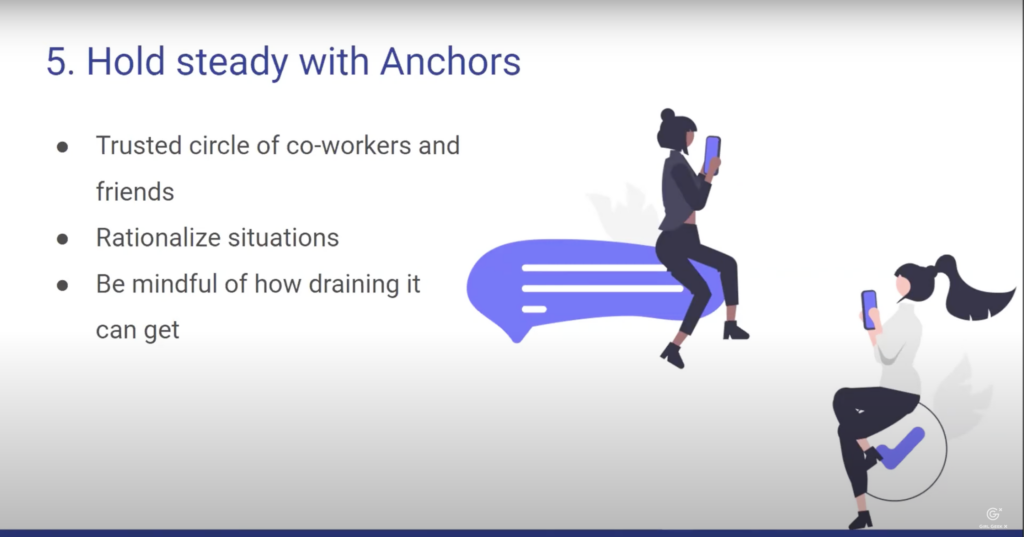
Ashu Ravichander: And if you don’t get a response, move on to someone else if it’s important for you to talk to someone at that time for that scenario. For me, if all else fails, I still text my mom and she replies back, so that’s a great thing. Put in effort into these relationships, and I always look to find ways to give back to the wonderful anchors that hold me steady.
Ashu Ravichander: Well, that’s my tool kit. To quickly recap what I have: Firstly, playbooks that I have built over time to give me great starting points. Second, spacers that help me pause and come back to a task when I’m ready. Third, is feedback, to cut the imposter syndrome in the bud and help me reinforce what I’m good at and what I can work on. Fourth, is assuming positive intent that can help move us all towards a common goal. And finally, fifth, my trusted circle of anchors that I can rely on.
Ashu Ravichander: Those were five of the more important tools I have in my tool kit. And even though I use these tools almost daily, I knew it still needs very intentional practice for it to be useful. And please know that you are not alone.
Ashu Ravichander: Ever since I posted that I was going to talk about this, I was worried whether being this open and vulnerable would impact my career, but it’s had the opposite effect. I’ve had so many people reach out to share their stories.
Ashu Ravichander: These are women who’ve founding companies, and someone else I met who’s had a really hard time with her mental health but is still so very successfully leading a large channel from one of the biggest companies in the world.
Ashu Ravichander: There are many people with these invisible struggles who are flourishing and building beautiful products. We just need to work differently. I’d love to hear your thoughts more about your tools, or maybe just connect on LinkedIn.
Ashu Ravichander: Thank you. And happy Women’s Day.
Sukrutha Bhadouria: Wow. Ashu, that was amazing. I felt like you were talking about me. Thank you so much for your amazing talk on managing mental health at work. I know from the comments, a lot of people really resonated with your tips and tricks specifically, because you gave so much context into what the actual problem was that you were looking to solve.
Like what you see here? Our mission-aligned Girl Geek X partners are hiring!
- Check out open jobs at our trusted partner companies.
- Watch all Elevate 2022 conference video replays!
- Does your company want to sponsor a Girl Geek Dinner? Talk to us!


